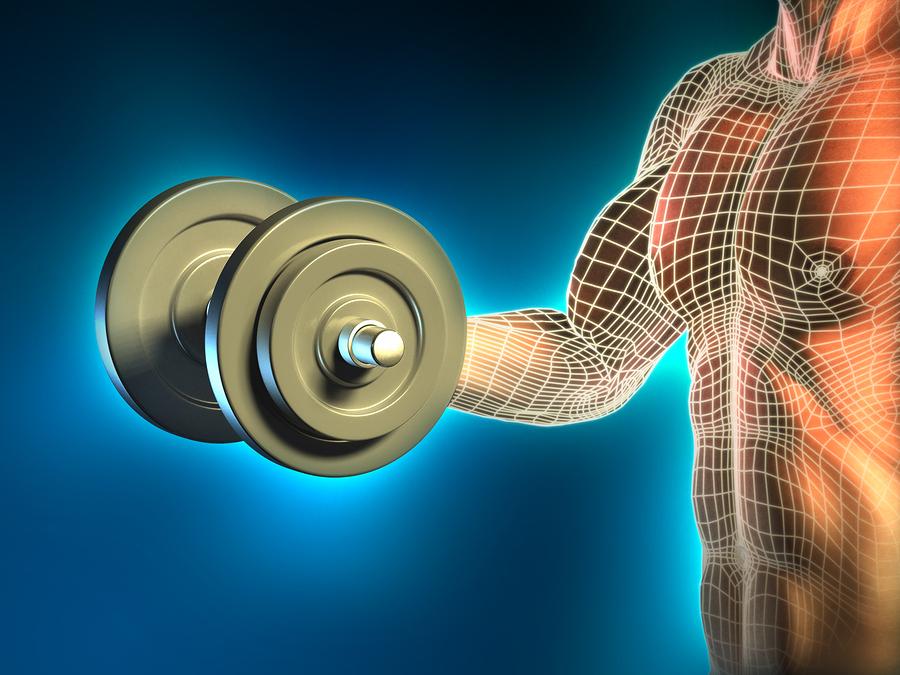Increased muscle mass is one of the most common reasons people exercise, alongside weight loss efforts and general fitness goals. Losing fat and gaining muscle is a usual expectation of those who work out regularly, but how many people actually understand how this process works? Understanding the science behind muscle growth can help you to establish a much more comprehensive understanding of how your body works in general. This can motivate you to stick to your workout regime as you are less likely to be disappointed by what you perceive to be slow results. It takes time to build your body up and the following article aims to help you develop your knowledge of this concept.
Building Muscle
When we talk about building muscle, we are referring to the skeletal muscles within the body. Skeletal muscles are made up of muscle fibers, composed of myofibrils (muscle protein strands) and sarcomeres. There are 650 skeletal muscles in the human body and they work by contracting when signals are received from motor neurons. These motor neurons instruct your muscles to contract, and as the efficiency of these signals improves, the stronger these muscles become. This is evident when we consider people who do not look especially muscular but are able to lift heavy weights.
Replace and Repair
Once you have completed a workout your body will begin to replace and repair any damaged muscle fibers. This occurs through a cellular process during which muscle fibers are fused together, thereby forming new strands of myofibils. These new myofibils will be thicker and larger, which is what creates the muscle growth. This muscle growth will happen whenever the occurrence of muscle protein synthesis is more than the rate of muscle protein breakdown. Many people mistakenly believe that this happens as you are lifting weights, when actually it occurs during the rest period afterwards.
When you do not allow your body to have ample time to rest between workouts, you are actually hindering the growth of your muscles. Lack of rest can reverse the anabolic process. You should always aim to leave at least 24 hours in-between strenuous workouts.
Testosterone and Muscle Gain
Men and women are different in many ways, and the way in which the different genders build muscle is no exception to this fact. Even when women work regularly with weights, it is unlikely that they will gain large amounts of muscle. This is because hormones play a very important role in muscle growth. The presence of the male hormone testosterone increases protein synthesis in the body and inhibits the breakdown of protein. Testosterone also activates satellite cells and stimulates other anabolic hormones. Satellite cells provide additional myonuclei to muscle fibers, aiding in the process of growth. Studies have shown that strength training helps the body to release more testosterone, as well as encouraging the muscle cell receptors to become more sensitive to this hormone. As women only have very minimal amounts of testosterone in their bodies, they do not react in the same way and therefore do not naturally experience the same muscle gains.
The Process of Muscle Growth
The process of muscle growth can be achieved through certain different means. Putting stress on existing muscles is at the essence of this process. In order to build muscle, this stress should be greater than what your body is already used to. This is why those who lift weights continuously increase the amount of weight that they lift, and the amount of repetitions that they do with each weight. Progressively increasing both the weight and the amount of reps will mean that your progress does not stagnate.
Hopefully this information has illustrated to you how slow the process of building muscle is, and how any serious gains will take place over a long time frame. Visible growth is unlikely to become apparent in a matter of weeks, and it is more likely that it will be several months before you experience a noticeable difference in your physical appearance. However, slow progress is positive progress and it means that your body is growing and becoming stronger in a healthy way. If you are trying to bulk up then in addition to any effort you make, your genetics will also play an important role. There are several different unavoidable genetic factors that can limit your ability to grow muscles to your desired level. As your training continues it will become apparent what your genetic restrictions are.
To aid the process of muscle growth as much as naturally possible, you should aim to include an adequate amount of protein in your diet every day. Many people mistakenly believe that they can only achieve this through animal products, but it is becoming increasingly apparent that plant-based proteins are a great choice for muscle growth and general health. Visit our blog again soon to get the low-down on plant based proteins!
References
1) http://www.builtlean.com/2013/09/17/muscles-grow/
2) http://www.bodybuilding.com/fun/issa7.htm
3) https://www.unm.edu/~lkravitz/Article%20folder/musclesgrowLK.html
Related Posts
Cigarettes May Inhibit Inflammation Treatments
Axial spondyloarthritis, also known as AxSpa, is a chronic…







